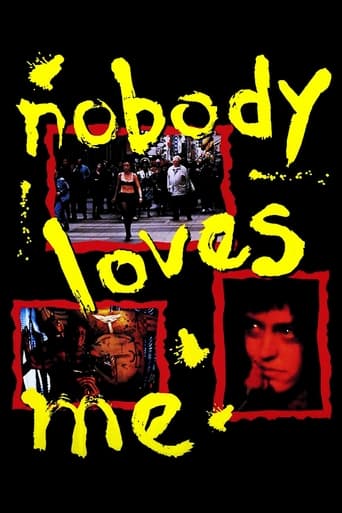



Truly Dreadful Film
Tied for the best movie I have ever seen
It is interesting even when nothing much happens, which is for most of its 3-hour running time. Read full review
View MoreThis is a gorgeous movie made by a gorgeous spirit.
View More"Keiner liebt mich" or "Nobody Loves Me" is a German movie from 1994, so this one had its 20th anniversary two years ago. The director is Doris Dörrie and she also write the short story this film is based on and adapted it herself for the screen here. And even if this film is already over two decades old, this is not one of Dörrie's earliest career efforts. She has been in film for a long time and there is no denying that she is among the most influential filmmakers in Germany. Many of her works have a strong connection to the country of Japan, also her most recent film, but this movie from the mid-1990s is not one of these. There is more a bit of an African connection in here. It runs for 100 minutes and stars Maria Schrader, who won a German film award for her performance here and for another two films. I have not seen these other two as they are clearly less known than this one here, but I am a bit shocked that such an unrealistic and over-the-top performance is appreciate too. Then again, a lot of this character has to do with how Dörrie wrote her. But even there, the German Film Awards screwed up as they honored the entire work as one of the best of the year. i guess we can be glad that "Der bewegte Mann" came out that year. Otherwise this film here may even have won the biggest awards of the night.I am a bit unsure what to think of Dörrie as a filmmaker, but overall I don't really like her I guess. Her films about the male or female psyche in a (not so) extreme situation eventually come down to the same and it is rarely really creative. The only film I very much enjoyed from her is "Erleuchtung garantiert". But back to this one here. It takes us in the life of Schrader's character as she is scared of not finding a man to marry anymore at the age of 30. A bit of a bizarre premise, not only because she is very attractive, but because people today find their significant others much later on many occasions and I doubt that the concept of "Torschlusspanik" started that early back then. And if it did, then you could still say the movie has not aged too well. Speaking of Schrader, I never saw a particularly gifted actress in her and this film just makes me think the same. I do believe she is a much better filmmaker herself though as she recently proved with her Stefan Zweig movie. I am also not too fond of the title here as it sounds really desperate and I don't really mean in terms of the desperate main character, but because of the desperate attempt to choose the baitiest title ever and lure as many people as possible into the theater. The supporting cast includes decently talented actors like Trissenaar, Naujoks and Król, but none of them were really given the material to shine in here. From minute one, it was all about Schrader and her character and with this attempt, the film turned into a major failure that feels unrealistic all the time in the way of the protagonist's actions and what happens to her throughout the film. For me, this is a contender for worst 1994 film. I highly recommend you to stay away.
View MoreIt's been years since i saw this film, but it left a lasting impression on me. It is so funny and cool. I really hope they release it on DVD with English subtitles because i don't understand German sadly.... I am (almost) willing to learn German just so that i can enjoy this film on DVD. It's that good :) The film is about this girl who is afraid to die, so she's taking a course preparing her for her death, and some strange vodoo man moves into her building. And if i remember correctly she's having an affair with her boss, or at least with someone who works with her, and it's a disaster... Her desperation and loneliness is easy to identify with, as well as her struggle for love and direction in her life.
View MoreI love this movie. I first saw in in a very urban hotspot that offered bagels and coffee at 10 AM to those who love to view fine cinema on Wednesdays. The miserable Fanny, the off the wall Orfeo... the fact that everyone has that crucial bottle of champagne in the refrigerator. A must see only because we are all odd people, whether we feel lucky or not doesn't figure into the equation. Lonely, desperate, or just finding out why we tick and what we tick for. If you can, see it, please!
View MorePierre Sanousi-Bliss, the actor who plays Orfeo in Keiner Liebt Mich, said of his role that he thought it was symbolic of pre-Wende years, when "East Germans lived alone in a world they had created." Orfeo, enigmatic psychic and gay Black tenant, is five months behind on his rent, and facing eviction. He spends his days telling fortunes on the street, or alternately, asking for money to get "back to Africa" and his nights as a drag queen in a bar, where his white businessman boyfriend smugly watches him. It is not difficult to make a convincing case in Sanousi-Bliss' favor, as Orfeo definitely exists in his own world, steadfastly creating a space in which he alone can exist, both by nurturing himself and pushing others away. When his apartment is repossessed and he begins to cohabit with Fanny, his mysteries unearth themselves and the two learn to share and depend on one another, approaching deeper issues of bonding and appreciating the present time. Dorris Dorrie, the writer and director of the film, said that it addresses the way "Germans seem unable to be happy with what they have." When Orfeo compares his state of living to Fanny's it is painfully evident how much she has that he does not, including job, house, and the "right skin color." Within this visual difference of race however, is a more probing study of German sentiment. Indeed, Orfeo is discriminated against in Germany: his fellow tenants don't want him living there, and passersby are more likely to give him money to leave the country than to read their palm. But Dorrie is not simply addressing racial tensions through the character of Orfeo, but as noted above, he is symbolic of a greater struggle in the German people. This struggle is the same one that Fanny faces in a more direct way, to rectify her existence with her imaginary ideal life, and to learn to appreciate what is real and surrounds her. In their final moments together before Orfeo 'dies,' he shares with her the secret of never wearing a watch, because it is always the same time, Now. Interesting then, that several years later Maria Schrader, who plays Fanny, is playing a lesbian woman in the midst of WWII in Aimee & Jaguar. And her final words in that film? That she wants plenty of Now's. Not memories, not futures, but now, and now, and now. It seems there is some form of spiritual integrity emerging through the minds of German directors. For in the final cathartic moments of German films, the feel-good lines are telling us what Eastern religions of meditation and mindfulness have preached for thousands of years. I recently attended a lecture by Professor Muhammad Bamyeh about post-nationalism, which interestingly enough, made some similar conjectures about the emerging solidarities throughout the world. One of the four noted was the spiritual, in which seemingly disparate peoples are actually approaching similar coping mechanisms, reaction and movements to the trends of post-national identities and globalization. It is possible that in this small word, "now," is the seed of cross-cultural understanding. An American may see Fanny Fink's plight and view it only in terms of the desires and unrequited loves, a German may see the representation of her culture. But both can comprehend the immediacy of understanding the moment, regardless if the moment is one person's or one people's. In the ongoing spiritual dialogue of the film we are given two disparate approaches: Fanny practices 'conscious dying' while Orfeo is arguably more busy with consciously living, at least in the time he's got. But when these two meet, their common points are made stronger, drawing from the other and reaffirming the other as well.
View More